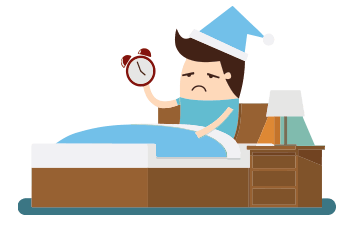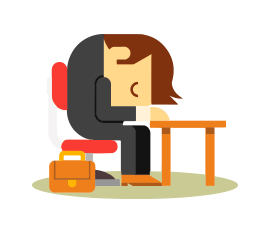It may seem that sleep should be an easily achieved natural consequence of a long day of work or other activity. However, our fast-paced 21st-century lifestyles bombard us with constant stimulation which is not conducive to a good night’s sleep. Sacrificing even an hour or two of sleep takes a toll on mood, energy, mental sharpness, and ability to handle stress. When it becomes a long-term reality, chronic sleep loss is a destroyer of health.
A Daily Battle
Insomnia is a daily battle for millions. It is the most common sleep complaint, encompassing a wide range of sleeping disorders, from lack of sleep quantity to lack of sleep quality. It occurs when you have trouble falling asleep or staying asleep even though you had the opportunity to get a full night of slumber.
The majority of adults have experienced occasional insomnia. It is a condition that regularly affects an estimated 25 percent of the general population. The causes, symptoms and severity of insomnia differ case by case. Insomnia may include:
- Difficulty falling asleep
- Difficulty staying asleep throughout the night
- Waking up too early in the morning
- Feeling tired and lethargic upon waking
One-third of our lives are spent asleep. Despite this, people generally know little about the importance of this life-giving activity. Many people mistakenly believe that they can learn to get by on little sleep without suffering negative effects. Research contradicts this belief, showing that getting enough quality sleep at the right times is vital for mental and physical health. Lack of sleep is linked to a number of serious health problems that can compromise long-term physical and emotional wellbeing – and your overall quality of life.
Short-Term and Chronic Insomnia
Generally speaking, many cases of poor sleep are temporary. Short-term insomnia is often caused by jet lag or stress, and adhering to a proper sleep regimen may be sufficient to solve the problem.
Insomnia is deemed chronic when a person has insomnia at least three nights a week for a month or longer.
Diagnosing Insomnia
So how do you know if you have insomnia? Take a look at the following indicators:
- You struggle to fall asleep, often taking longer than 30 minutes.
- You wake up throughout the night or awaken earlier than planned and are unable to get back to sleep.
- You have daytime symptoms such as fatigue, moodiness, sleepiness or experiencing reduced energy throughout the day.
- You frequently get less than seven hours of sleep.
What Contributes to Insomnia
Insomnia can be caused by psychological, physical, biological, and environmental factors. Chronic insomnia is frequently tied to an underlying medical condition.
Psychological
Stress and anxiety may cause sleeping problems or worsen existing problems. Worries about work, relocation, school, health, finances, or family can mean your mind stays in high gear at night. Stressful life events or trauma – such as the death or illness of a loved one, divorce, or a job loss – also may lead to insomnia. In the case of stress-related insomnia, alleviating the stress should alleviate the insomnia.
In addition, many are trapped in the “classic paradox of insomnia: wanting sleep so badly that they can’t get it.”
Medical conditions and medications

Many medical conditions and diseases can contribute to insomnia, including asthma, allergies, migraine, sleep apnea, acid reflux, diabetes, cardiovascular disease, kidney disease, musculoskeletal disorders, mental health problems, neurological disorders, hyperthyroidism, kidney disease, cancer, Parkinson’s disease, and Alzheimer’s disease. Chronic pain is also a common cause of insomnia.
A number of prescription and over-the-counter medications used to treat the aforementioned medical conditions and other health problems have side effects that impair sleep quality and quantity. If you are taking any medications on an ongoing basis, consult with your doctor about whether they could be hampering your sleep and, if they are, find out if alternatives are available.
Disruptions in circadian rhythm
Your circadian rhythms act as an internal clock, guiding such things as your sleep-wake cycle, metabolism and body temperature. Disrupting your body’s circadian rhythms can lead to insomnia. Causes of such disruption include jet lag from traveling across multiple time zones, working a late or early shift, or frequently changing shifts.
Environmental

Your sleeping environment must be conducive to peace. Noise, light seeping through the window, a bedroom that’s too hot or cold, or an uncomfortable mattress or pillow can all contribute to insomnia.
Eating too much
Overeating or eating too close to bedtime may cause you to feel physically uncomfortable while lying down. Heartburn, a backflow of acid and food from the stomach into the esophagus after eating, may keep you awake.
Importance of Adequate Sleep
Your brain stays busy while you sleep, conducting biological maintenance that keeps your body in a functional condition, preparing you for the day ahead. Without enough hours of restorative sleep (approximately seven to nine hours), you won’t be able to work, learn, create, and communicate at a level even close to your true potential. Regularly skimp on “servicing your body” and you’re on your way to a serious mental and physical malfunction.
As you start getting adequate sleep, your energy, efficiency, and overall health will improve. In fact, you’re likely to find that you become more productive during the day compared to skimping on sleep and working longer. In other words, adequate sleep helps you work smarter instead of harder.
The Impact of Chronic Insomnia

People with long-term insomnia suffer the following symptoms:
- Decreased concentration, mood and memory
Chronic insomnia impacts work performance and personal relationships. Insomnia slows down your thought processes, making it more difficult to focus and pay attention and thus increasing the likelihood of confusion. This hampers your ability to perform tasks that require logical reasoning or complex thought. If your sleep habits are subpar you could be curtailing your productivity, cutting out any chance for creative ideas to develop.
Lack of sleep causes irritability and anger and may lessen your ability to cope with stress. People who are sleep-deprived may be at greater risk of anxiety and depression. Poor sleep quality causes memory loss and forgetfulness. - Stunted physical development
Sleep is essential to healthy growth and development. Deep sleep prompts the body to release the hormone that promotes normal growth in children and teens. This hormone also promotes muscle mass and helps repair cells and tissues in children, teens and adults. Without enough sleep a child’s growth may be stunted. - Weakened immune system
Studies show that people who don’t get quality sleep or enough sleep are more likely to get sick after being exposed to a common cold virus. During sleep, your immune system releases proteins called cytokines, some of which help to promote sleep. Certain cytokines must increase in order for you to fight infection or inflammation, or deal with stress. Sleep deprivation may decrease production of these protective cytokines. In addition, infection-fighting antibodies and cells diminish during periods when you don’t get enough sleep. In order to maintain its ability to fight infectious diseases, the body must get adequate slumber. - Increased risk of chronic diseases
Sleep is critical to restoration and repair. While you sleep, your body works to heal and repair your heart and blood vessels. Sleep also impacts your reaction to insulin, the hormone that controls your blood-glucose (sugar) level. Sleep deficiency results in an elevated blood-sugar level, which may increase your risk of diabetes. Chronic insomnia is linked to an increased risk of heart disease, kidney disease, high blood pressure, and stroke. - Hormonal Issues
Most hormone secretions are controlled by the circadian clock and sleep is one of the events that has a significant bearing on daily hormonal rhythms and levels. Sleep helps balance appetite by regulating the levels of the hormones ghrelin and leptin. These hormones play a role in our feelings of hunger and fullness. When we’re sleep-deprived, we may feel the need to eat more, which can lead to weight gain. According to a recent study, both male and female fertility can be adversely affected by sleep deprivation. Also, women who fail to get enough sleep show signs of premature skin aging.
Let’s Put to Rest Some Myths About Sleep

Myth 1: Drinking milk before bed helps you to sleep
In order to ingest enough tryptophan to impact your serotonin levels, you would have to drink at least two liters of milk.
Myth 2: Counting sheep helps you to fall asleep
According to a study, those who counted sheep took, on average, 20 minutes longer to fall asleep.
Myth 3: Drinking alcohol helps you to sleep better
Although alcohol is known to help a person fall asleep more quickly, consuming it too close to bedtime can disrupt the second half of your sleep as the body starts to process the alcohol.
Helping You Sleep Better
The hour before you go to sleep should be relaxation time. Try some of the following all-natural sleep aids which help you fall asleep fast and wake up refreshed.

- Put a sliced orange or lemon next to your bed at night. According to research, the smell of citrus relaxes brainwaves and calms emotions.
- A hot bath (38 ℃ to 40 ℃ is appropriate) relaxes your body and mind, consequently inducing sleep. To reduce muscle tension and relieve stress and anxiety, add a few drops of lavender essential oil to your bath and two cups of Epsom salts. The magnesium in Epsom salts is absorbed through the skin, promoting tranquility and easing irritability.
- Close your eyes and relax the muscles around your eyes. Breathe deeply. Continue to spread that quality of relaxation all the way down to the tips of your fingers and the tips of your toes.
- Begin to visualize a scene. For example, imagine you are in the vast expanse of an endless meadow, where everything is tranquil, harmonious and beautiful. Let your body and spirit relax.
- Listen to soothing music before sleep.
- If you are awake for more than 30 minutes in bed, move to a different part of the house (one without bright lights). Do something relaxing such as listening to soothing music or meditating for a while, until you begin to feel tired. Staying in bed only results in frustration over not sleeping and exacerbates your insomnia.
- Wear an agarwood bracelet to sleep or burn 100 percent natural, plant-based incense in your bedroom. Certain incense aromas work to slow down the heartrate and soothe nerves. Try burning lavender or sandalwood.

Maximize Your Sleep Hours
Researchers have identified a variety of practices and habits that can help anyone to maximize the hours they spend sleeping.
- Pay attention to what you eat and drink
Try eating foods high in magnesium, say researchers at Edinburgh and Cambridge Universities.
Magnesium regulates circadian rhythms, so you get sounder, more satisfying sleep. High-magnesium foods include millet, walnut, almond, yogurt, kefir, sunflower seed, pumpkin seed, lotus seed, spinach, chard, black bean, avocado, fig, banana, and red date. At night, steer clear of fried, greasy, cold or spicy food.
Don’t drink anything in the last two hours before bed. Frequent urination can affect sleep quality. Avoid caffeinated beverages such as tea and cola, as well as other stimulating drinks. If you want a midday cup of coffee, drink it before 2 p.m. - Regular work and rest routine
Go to sleep and wake up at roughly the same time every day, even on weekends. Doing so sets the body’s “internal clock,” training it to expect sleep at a certain time night after night. This routine gets your brain and body on a healthy snooze-wake schedule. You’ll be able to nod off quickly and rest soundly through the night after adhering to a sensible sleep routine for a period of time. - Create a pleasant, comfortable sleep environment
The sleep environment should be calm, peaceful, cool, quiet, dim, comfortable, and uncluttered. - Stay away from work and electronic products
Keep your computer, TV, and work materials out of the room so as to strengthen the mental association between your bedroom and sound slumber. Research shows that the blue wavelengths emitted from screens may delay the production of melatonin, the hormone that helps us drift off. Therefore, stop screen time at least 30 minutes before going to bed, to help your mind and body unwind and prepare for sleep. - Right amount of exercise
Regular 30-minute sessions of exercise can help you sleep better at night. It is best not to do strenuous exercise three hours before going to sleep since the post-workout burst of energy can keep you awake. Studies have shown that after four to 24 weeks of exercise, adults with insomnia fell asleep more quickly, slept slightly longer, and had better sleep quality than before they began their exercise regimen. - Exposure to natural light
Natural light helps to maintain a healthy wake-sleep cycle. Venture outside frequently to be exposed to sunlight during the day and darkness at night. - Postpone worrying
Put aside any work or complicated decisions two to three hours before bed. It takes time to turn off the “noise” of the day. If you have still got a lot on your mind, jot down your worries. Writing down your thoughts can help you let them go for the night. - Practice gratitude
Research has shown that what we think about for the last five minutes before we drift off has a tremendous bearing on sleep quality. Spending the last five minutes before we sleep practicing gratitude induces the relaxation response, increases sleep quality, reduces the time required to fall asleep, and increases sleep duration.
Solutions to insomnia do exist. Addressing the underlying causes and making changes to your lifestyle, daily habits, and sleep environment can put a stop to the frustration of tossing and turning. A good night’s sleep is refreshment to the mind and nourishment to the body, giving you the optimism and strength to face the day.

